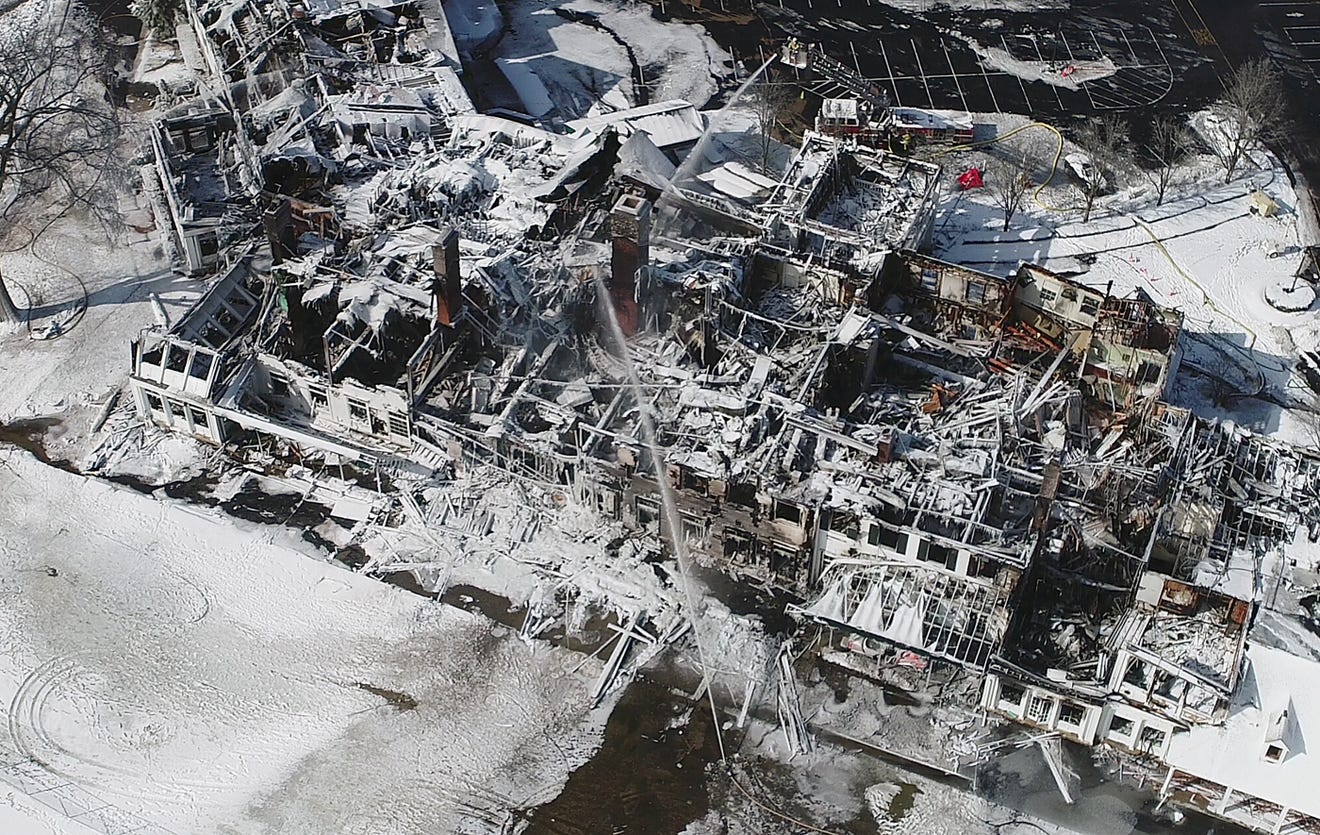Oakland Hills Country Club president Rick Palmer was at home just minutes from the iconic clubhouse near Detroit on Thursday when he learned the 100-year-old structure was on fire.
“I got the call from (general manager) Christine Pooler about right when it happened,” said Palmer, who retired last year after owning a trucking company and who has been a member of the club in Bloomfield Hills for 26 years. “She at that point says, ‘We’ve got a real issue here and it could be severe.’
“From a personal note, I walked out the door and my wife said, ‘What’s the issue?’ And I said, ‘Well, I think Oakland Hills is on fire.’ And she said, ‘What do you mean?’ because we always have issues. And I said, ‘No, literally.’ ”
The fire grabbed national attention, torching one of the most historic private clubhouses in the United States. The club has been host to numerous championships since its inception in 1916, including six U.S. Opens, two U.S. Senior Opens, a U.S. Women’s Amateur, two U.S. Men’s Amateurs and three PGA Championships.
The cause of the fire in which nobody was injured has yet to be determined, and the Detroit Free Press reported that an exact cause of the conflagration may never be determined. The club had a fire-suppression system, but the flames could have spread inside wooden walls and under floors. The point of ignition may have been destroyed, leaving few clues as investigators pick through charred remains.
Palmer said Monday the club is working with its insurance providers to determine what might be salvageable and what next steps the club will take in rebuilding. It’s too soon to have answers, he said, although the club has initiated conversations with several architectural firms. It likely will take years to rebuild the structure.
One thing is certain after hearing Palmer speak: The golf and many other activities will carry on, even in the short term as the spring season begins. The fire didn’t damage the club’s two courses, the South and the North.
“Keep in mind, besides other than the clubhouse fire, our tennis building, our golf operations building and out maintenance facility were all untouched,” Palmer said. “… Our membership is fully behind us. We will be as strong as ever.
“I can report that at our board meeting this past Saturday morning that the board easily made a unanimous decision and determined that the restored, rebuilt clubhouse will be a replica of what the iconic clubhouse was before the fire. Our membership and the national golf community really made that an easy decision for us to make, because of the outpouring of how special it is – even our (recent) golf course architect, Gil Hanse, who wants our clubhouse to match his beautiful restoration work.”
Hanse and his design partner Jim Wagner in 2021 completed a restoration of the club’s South Course, originally designed by Donald Ross and opened in 1918, and that track is slated to host the U.S. Women’s Open in 2031 and 2042. The South Course ties for No. 23 on Golfweek’s Best ranking of classic courses built before 1960 in the U.S. The club’s North Course ties for No. 196 on that list.
The U.S. Golf Association has voiced its support to Palmer that there should be no issue with the planned Women’s Opens, and the club is still in talks in with the USGA about hosting other possible championships.
“Our partners at the USGA have been incredibly supportive in their calls,” Palmer said.
That extends all the way to how the club might operate in coming months and years as the clubhouse is rebuilt, everything from what functions might be possible to where will members grab lunch after a round of golf. The USGA has offered its expertise in building temporary structures to help Oakland Hills while the clubhouse is rebuilt, and a local company has provided space for displaced club employees to continue working.
“We want to move quickly, but we want to move slow in order to move fast because we’re really making not just a 2022 decision, but a 2023 and potentially 2024 decision, depending on the process,” Palmer said.
He said it was a terribly emotional experience watching the clubhouse burn, but he expressed his gratitude that none of the approximately 25 employees who were present were harmed. He said in peak season the clubhouse sometimes has as many as 300 employees present. He also expressed gratitude that the club only “lost things” and not people.
The extent to which things were lost is still being determined. The club is operating as if the building is a total loss, Palmer said, while official word from the insurance company is pending.
The clubhouse also was packed with memorabilia from decades of championships, some of which was salvaged even as the building burned.
“We had the fire crews come in and announce to us that they had a window, and asked where was the memorabilia, where was it at?” Palmer said. “And they kept going in and out of the facility and actually passing that (memorabilia) out to our employees, who formed kind of a breadline and loaded that into a van. There are a lot … of our valuable items that got recovered, and we’re just assessing whether they are fully OK.”
It will take time to catalogue what items were lost and what was rescued and its condition, Palmer said. The club is working with its insurance company to assess all those concerns.
“Watching the great work by the firefighters who, between the weather and the wind and where it was going,” Palmer said, “they were fighting an heroic uphill battle right from the start.”

